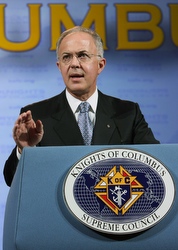On Jan. 14, Pope Benedict XVI approved plans for the May 1, 2011 beatification of his predecessor, who died on April 2, 2005.
Throughout his 26-year reign, Pope John Paul II –who currently bears the title “Venerable”– was noted for his special appeal to young people, often providing a striking counterexample to the cynicism that came to characterize popular culture during the 1980s and 90s.
The Supreme Knight described the upcoming beatification ceremony, which will permanently place the late Pope's memorial on the Church's liturgical calendar, as “a validation of the 'John Paul II generation'.” Countless young people, he recalled, had their lives changed while attending the late Pope's celebrations of World Youth Day.
“Young adults especially look for authenticity,” the Anderson observed. “They can judge authenticity when they experience it.”
In their encounters with Pope John Paul II, young people could sense that “he loved them,” and loved God wholeheartedly. “The secret of so many World Youth Days,” he said, “was that relationship … They understood that it was authentic.”
Anderson reflected that the Pope upheld love, both human and divine, as the “underlying theme” of his pontificate – proclaiming to the world “the fundamental Gospel command, love of one's neighbor.” This emphasis on human participation in God's love made his message unusually accessible to young people, and to all the lay faithful.
The Supreme Knight described the upcoming beatification ceremony, which will permanently place the late Pope's memorial on the Church's liturgical calendar, as “a validation of the 'John Paul II generation'.” Countless young people, he recalled, had their lives changed while attending the late Pope's celebrations of World Youth Day.
“Young adults especially look for authenticity,” the Anderson observed. “They can judge authenticity when they experience it.”
In their encounters with Pope John Paul II, young people could sense that “he loved them,” and loved God wholeheartedly. “The secret of so many World Youth Days,” he said, “was that relationship … They understood that it was authentic.”
Anderson reflected that the Pope upheld love, both human and divine, as the “underlying theme” of his pontificate – proclaiming to the world “the fundamental Gospel command, love of one's neighbor.” This emphasis on human participation in God's love made his message unusually accessible to young people, and to all the lay faithful.
“The more people get to know John Paul II, the more they will be uplifted,” he said, citing the Pope's personal witness to a vision of life “premised on the fundamental commandments of the Christian faith: love of God, and love of neighbor.”
“That's what he stood for throughout his life, and made so apparent for all to see,” Anderson noted, upholding the Pope as a man who strove to inspire others through his own example.
He spoke warmly of his own encounters with the Pope, recalling that he gave his full attention and care to anyone he met. “Every time you met John Paul II, you had his attention. He was interested in you.”
Supreme Knight Anderson pointed out that the beatification had a special relevance to Americans, a people who were close to the late Pope's heart. John Paul II recognized the nation's cultural and political ascendancy during his reign, and was “very concerned about what we did as a society, and our future.”
“I hope that Americans, and American Catholics especially, will look to his beatification – to take pause, and remember what he told us.”
“We should remember those words,” the Supreme Knight advised, recalling the Pope's exhortations for Catholics, and all people of good will, to “stand up when human rights are attacked, when the unborn are threatened, when marriage is undermined, and the poor and suffering are neglected.”
He spoke warmly of his own encounters with the Pope, recalling that he gave his full attention and care to anyone he met. “Every time you met John Paul II, you had his attention. He was interested in you.”
Supreme Knight Anderson pointed out that the beatification had a special relevance to Americans, a people who were close to the late Pope's heart. John Paul II recognized the nation's cultural and political ascendancy during his reign, and was “very concerned about what we did as a society, and our future.”
“I hope that Americans, and American Catholics especially, will look to his beatification – to take pause, and remember what he told us.”
“We should remember those words,” the Supreme Knight advised, recalling the Pope's exhortations for Catholics, and all people of good will, to “stand up when human rights are attacked, when the unborn are threatened, when marriage is undermined, and the poor and suffering are neglected.”

No comments:
Post a Comment